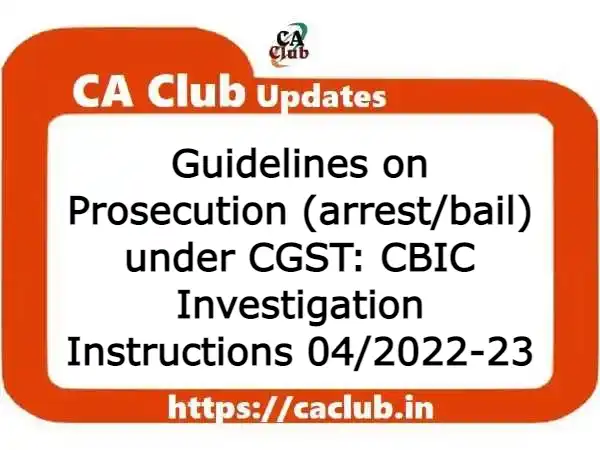The CBIC has issued guidelines/instructions on arrest and bail for offences punishable under the CGST Act, 2017, vide GST Investigation Instruction No. 04/2022-23.
All field formations must follow these instructions/guidelines in order to initiate a GST prosecution. The offences that warrant the institution of criminal proceedings and prosecution are codified in Section 132(1) of the CGST Act.
CBIC has directed that anyone who commits any of the offences specified in Sections 132(1) and (2) of the CGST Act, 2017, can be prosecuted, and that the process should normally be initiated when the amount of tax evasion, misuse of ITC, or fraudulently obtained refund in relation to specified offences exceeds Rs. 500 lac.
Furthermore, the monetary limit of Rs. 500 lac shall not be applicable in certain cases, such as those investigated by DGGI (except in cases involving single/multiple taxpayer(s) under Central Tax administration in one Commissionerate where arrests have not been made and prosecution is not proposed prior to issuance of show cause notice), where prosecution complaints shall be filed and followed up by DGGI.
In all other cases, the complaint must be filed by an officer at the level of Superintendent of the jurisdictional Commissionerate who has been authorised by the Pr. Commissioner/Commissioner of CGST.
These instructions further provides that in all cases investigated by DGGI, the prosecution must be sanctioned by the appropriate DGGI officer. Furthermore, it specifies the procedure for appealing a court order in the event of insufficient punishment/acquittal, the procedure for withdrawing prosecution, the publication of the names of those convicted, the monitoring of prosecution, the compounding of offences, the inspection of prosecution work by the Directorate General of Performance Management, and so on.
Because prosecution sanction has serious ramifications for the person involved, the nature of evidence gathered during the investigation should be carefully evaluated.
The availability of adequate evidence is an important consideration when deciding whether or not to prosecute. A criminal prosecution requires a higher standard of proof than an adjudication proceeding because the case must be established beyond reasonable doubt.
As a result, even if the demand is confirmed in adjudication proceedings, the evidence gathered should be weighed in order to meet the above criteria for recommending prosecution. Decisions should be made on a case-by-case basis, taking into account various factors such as the nature and gravity of the offence, the amount of tax evaded, or ITC wrongfully obtained, or refund wrongfully obtained, and the nature and quality of evidence collected.
Prosecution should not be filed simply because a demand was confirmed in the adjudication proceedings. Prosecution should not be initiated in cases of a technical nature, or where an additional tax claim is based on a difference of opinion regarding the interpretation of the law.
Furthermore, the evidence gathered should be sufficient to establish beyond a reasonable doubt that the person had a guilty mind, knowledge of the offence, fraudulent intent, or possessed mens-rea for committing the offence in any way.
As a result, in the case of public limited companies, prosecution should not be launched indiscriminately against all Directors, but should be limited to only those who oversaw day-to-day operations of the company and took active part in committing tax evasion, etc., or had connived at it.
Normally, a decision on prosecution should be made immediately after the adjudication proceedings are completed, except in cases of arrest, where prosecution should be filed as soon as possible.
A prosecution complaint may even be filed prior to adjudication of the case, particularly if the offence involved is serious, qualitative evidence is available, or it is anticipated that the concerned person will delay the completion of adjudication proceedings. When an offender is arrested under Section 69 of the CGST Act, 2017, a prosecution complaint may be filed even before the Show Cause Notice is issued.
CBIC GST Investigation Instruction No. 04/2022-23 dt. 01/09/2022: CBIC guidelines for arrest and bail, in relation to offences punishable under the CGST Act, 2017
